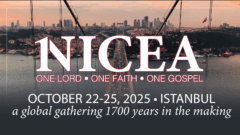Every pastor, and I suppose every Christian as well, has a kind of theological toolbox, a means of dealing with the questions and concerns that appear throughout life. I was thinking recently about the tools I use most often and narrowed it down to two. There are two grids I’ve found especially helpful, and ones I return to again and again, not only in my own life, but also as I interact with others.
What Is of Primary Importance?
How do we know which of the Christian doctrines are most important? How do we know where we must stand firm without wavering and where we may be able to work with others despite differences? While no truth is insignificant, there are clearly some doctrinal foundations that, if disrupted, will force the whole structure to collapse.
I have been helped here by Al Mohler who borrowed from the medical world to describe theological triage. Theological triage is a means of sorting doctrine into three levels of theological urgency.
First-level doctrines are those that are those that are most central and essential to the Christian faith. They are doctrines such as the Trinity, the full deity and humanity of Jesus Christ, justification by faith, and the authority of Scripture. These are the doctrines that demanded councils and creeds. These are the doctrines that if you deny, you will soon deny the Christian faith altogether.
Second-level doctrines are significant issues, but ones for which there is still disagreement among gospel-believing Christians. We can still affirm the faith of those who believe the opposite of what we believe, but we may not be able to enjoy denominational or local-church fellowship with them. These are issues such as the meaning and mode of baptism, and whether or not women are permitted to serve as pastors.
Third-level doctrines are those for which Christians may disagree, even while maintaining the closest kind of fellowship. You and I may believe different things here, but it will not diminish our fellowship and we can easily participate in the same local church. Eschatology is an example of this kind of doctrine, where as long as we affirm the bodily and victorious return of Jesus Christ, we may disagree on exactly what sequence of events will lead to it.
Theological triage sorts doctrines into one of these three categories and helps us see which issues are the most urgent and important and which issues ought to receive the most thorough and vigorous defense. This is a tool I find myself pulling out of my toolbox again and again.
How Can I Know God’s Will?
How do we know what God desires from us? How can we know God’s will for our lives? This is a question we all ask at various points in life and it is a question we all need to help others with from time to time. The tool I use here simply requires asking three questions.
What does the Bible say? The first and most foundational question is what God tells us in his Word. What we are especially looking for here is one of two things: a clear command that we must do something, or a clear command that we must not do something. If the Bible speaks directly to the issue, we’ve got to obey right away. When God speaks, we must listen and act.
But the Bible does not always offer explicit guidance, so we often need to ask a further question, and here we cross a line of freedom. When God clearly tells us what we must do or must not do, we need to obey immediately and unquestioningly. But when God does not offer explicit guidance, we are no longer bound by what the Bible clearly says we must or must not do. Instead, we now have some freedom to act.
So the next question we need to ask is this one: What is the wisest choice? Or what is the choice that will be most spiritually profitable? Neither choice will be sinful, but which one seems to offer the greatest opportunities? This is a time to use our God-given minds and our Spirit-filled minds, to think through the issues and decide on the wisest course.
If that question does not resolve the matter, then we can simply ask this one: What do I want to do? Once we have ensured that we are not disobeying God, and once we have ensured that we are not doing something unwise, we have freedom to act according to our desires.
Those three questions direct us whenever we encounter a question that involves God’s will for our lives. (I have written more about this here: How Do I Make Decisions That Please God?)
And as I wrap up, it surprises me how often I return to these two tools and how very simple they are. Yet these two simple questions have directed me through so many theological storms and through so many major decisions.










